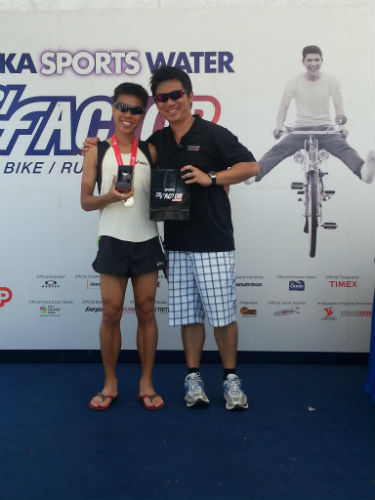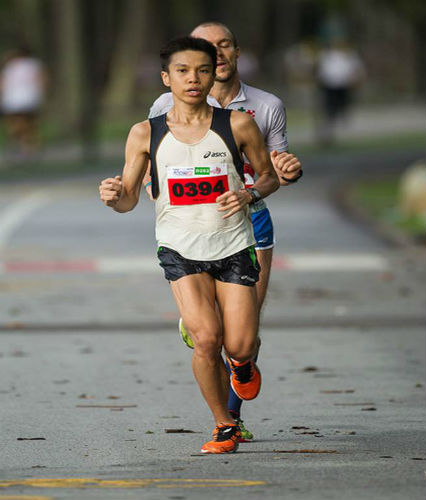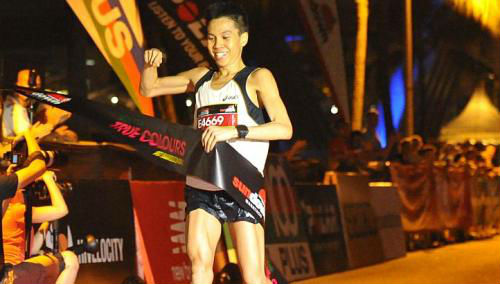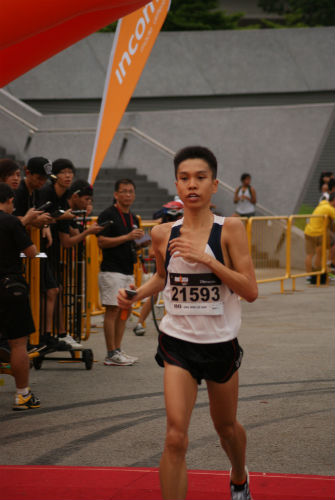With a time of 2hour 4minutes 47seconds, Alex Ong, 26, won the men’s 31.5km race at the recent Pokka Tri Factor run in Singapore.
How did this trainee teacher manage to achieve such a stunning timing and what are his secrets to success? In this short interview, I caught up with Alex to find out – and get some tips from him about distance running.
Read on to see what Alex has to say.
What is the secret to your success at the Pokka Tri Factor run?
I was fortunate to have Timothy, runner-up at the running event, for company during most of the race. Running together with him made pacing a lot easier.
What is your training regime like when you are preparing for a race?
I clock mileage by doing most of my runs at an easy pace. After some of these runs I would do some strides to maintain leg speed and turnover. Speed work for me comes in the form of tempo runs, fartlek and hills but they do not dominate my schedule.
What do you think is the best combination of training methods for runners to optimise performance?
A good training combination should include a healthy mix of workouts that, when used in the proper proportions, lead to optimal performance on race day. However, each runner responds differently to each type of run. Some runners perform better by doing lots of speed work, others respond better to high mileage. Therefore, runners should explore different combinations before evaluating what works for them. To determine their best routine, runners can maintain a running log to look for patterns.
Are there any special dietary considerations that you follow for achieving top performance?
I love my fruits and vegetables! Packed full of nutrients, they help my body to recover from the rigours of running. I do not follow any strict dietary restrictions but I try to avoid deep fried food whenever possible. Having said that, I feel that it’s ok to indulge in these once in a while.
Do you have any tips for people who are interested to take up distance running?
Start with easy runs and low mileage before gradually building up. Going too fast or running too much, too soon will only result in injuries. The body needs time to adapt to increases in mileage or speed.
How would you advise someone who wants to take part in their first marathon?
Have an achievable goal timing in mind – and work towards it. This means having to set aside at least three months for preparation work. Focus on long, easy-paced runs as they teach your body how to utilise fuel stores efficiently. It’s also a good idea to practise hydrating on these runs.
What would you recommend for a runner who wants to improve their personal best timings?
The stress of wanting to run faster and over-thinking can be counter-intuitive to runners seeking personal best timings. Don’t get too hung up on running a certain number of miles per week. Yes, to improve personal best timings, runners must physiologically stress their bodies. However, I find that many runners neglect the recovery portion of training. It’s only through a stress and recovery cycle that our bodies become stronger.
Good pacing during races is important as well. Don’t just focus on hitting splits. Instead, learn to listen to your body and look out for signs that you might be going too hard, too soon.
How would you advise a runner who wants to “progress” from shorter races, to running a full marathon?
Training-wise, marathons are different from shorter races as mileage becomes the focus when training for the marathon. However, it’s also a good idea to maintain leg speed by performing some faster runs. Speed work need not necessarily be daunting. It can be as easy as incorporating strides after some of your runs.
Shorter races are more intense than the marathon. It’s easy to get carried away by running too quickly at the start of a marathon. Calculate your average pace for shorter races in order to have a good idea of your marathon running pace.
What is one thing that aspiring distance runners should remember?
It’s going to take a lot of hard work and patience to develop endurance for distance running. So don’t expect instant results or be disheartened when there is a lack of progress in training.
Any final words that you have for aspiring runners out there?
Training consistently is key to injury-free and successful running. Running an extra 5km isn’t going to be meaningful if it results in injury. Be progressive in training and increase mileage only when you’re ready and comfortable.
Get more tips from leading runners!
- Mok Ying Ren (Recovery)
- Mok Ying Ren (Pacing)
- Mok Ying Ren (General Tips)
- Ashley Liew
- SG Blade Runner
- Sundown 100km Ultramarathoner





Leave a Comment